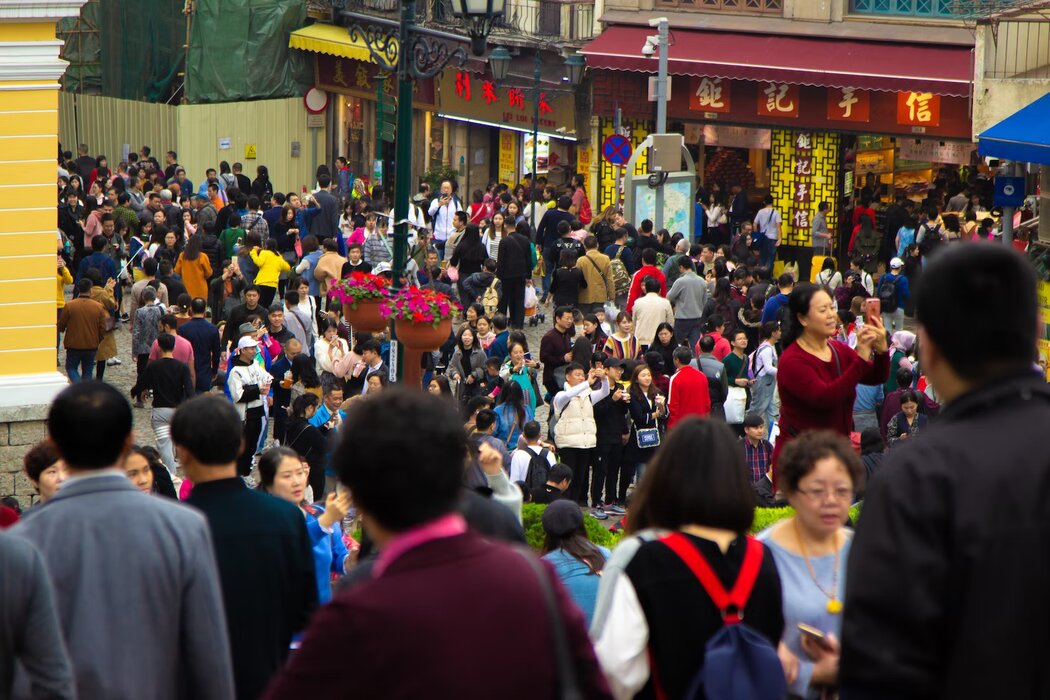Economic News
FTX Bankruptcy Caused Chaos in Crypto
Published
3 years agoon
By
adminThe crypto sector is already tearing itself apart in public three days into the new year, still fallout from the FTX collapse last year.
A behind-the-scenes battle has recently been made public.
This quarrel is one of the ramifications of the former crypto emperor Sam Bankman-Fried’s bankruptcy. It puts three of the industry’s biggest names against each other.
On one side, there are the rich twin brothers Cameron and Tyler Winklevoss, and on the other, there is Barry Silbert, one of the industry’s barons. The former launched the cryptocurrency exchange Gemini, while the latter is the founder and CEO of Digital Currency Group (DCG), the parent company of troubled cryptocurrency lender Genesis.
‘Bad Faith Stall Techniques’
Genesis was Gemini’s partner in a customer-attraction reward program given by the platform. Gemini Earn is the name of this initiative. It’s a high-yield savings program that promises cryptocurrency exchange consumers up to an 8% yearly return on crypto deposits, depending on the assets stored. Genesis serves as Gemini’s major lender under this arrangement.
After the bankruptcy of FTX and its sister company Alameda Research, a hedge fund that also served as a trading platform for institutional investors, everything went downhill. Last November, Genesis did business with FTX and was forced to restrict withdrawals, forcing Gemini to do the same for Earn program participants.
Genesis owes Gemini’s Earn users $900 million. The two companies have been attempting to resolve the issue for several weeks, but nothing appears to be moving forward. So says Cameron Winklevoss in a Twitter open letter to Silbert. He accuses him of acting in bad faith.
“For the past six weeks, we have done everything we can to engage with you in good faith and collaborative manner in order to seek a consensual settlement for you to pay back the $900 million that you owe, while also assisting you in the preservation of your firm,” Cameron Winklevoss wrote. “We recognize that there are startup costs to any restructuring, and things don’t always go as quickly as we would all want.”
However, he went on, “it is now evident that you have been participating in bad faith stall tactics.”
Cameron argues that Silbert does everything he can to avoid sitting around the table with them to find a way to end the case.
“For example, on December 2nd, we stated our conviction that having everyone in a room together as soon as possible will be the most productive road toward reaching a resolution. You agreed but stressed that you would only do so if a proposition was on the table,” Winklevoss claimed.
The 8th of January
“However, on December 17th, a proposition was delivered to you. On Christmas Day, December 25th, an updated version of this proposal was given to you. Despite this, you continue to refuse to sit down with us and work out a solution.”
He further stated that Silbert will not agree to a timetable with important milestones.
“Every time we ask for tangible participation from you, you hide behind lawyers, investment bankers, and process. Your behavior after six weeks is not only absolutely wrong but also unconscionable,” Winklevoss slammed.
He then blames Silbert for the crisis, citing DCG’s debt to Genesis.
“To be clear, this mess is completely your fault,” Winklevoss stated. “Digital Currency Group (DCG) owes Genesis (its fully owned subsidiary) $1.675 billion, of which you are the founder and CEO. This is the amount of money owed by Genesis to Earn users and other creditors. You used schoolteachers’ money to fund selfish share buybacks and illiquid startup ventures.”
This is the figure Silbert disclosed with investors in November. It consists of a $575 million loan due in May and a $1.1 billion promissory note due in June 2032, both of which are linked to the failure of hedge fund Three Arrows Capital, or 3AC, which was even before the fall from grace of FTX.
“DCG did not borrow $1.675 billion from Genesis,” Silbert said in a Twitter statement. “DCG has never missed an interest payment to Genesis and is up to date on all outstanding loans; the next loan maturity is in May 2023.”
He also stated that DCG responded to a Gemini proposal but has yet to hear back.
“DCG delivered a proposal to Genesis and your advisors on December 29th and has received no response,” Silbert claimed.
Those comments were quickly dismissed by Winklevoss, who maintained his claims and asked Silbert if he could commit to resolving the dispute by January 8.
“You’re at it again. Stop pretending that you and DCG are innocent bystanders who had nothing to do with this debacle. It’s utterly deceptive,” Winklevoss argued. “How does DCG owe Genesis $1.675 billion if the money was not borrowed?”
“Will you agree to resolve this by January 8th in a way that treats the $1.1 billion promissory note as $1.1 billion?”
The Cryptocurrency Exception
This debate highlights the complexities of the connections between the numerous stakeholders in the fledgling blockchain-powered financial services market. Firms are frequently linked, but typically never divulge these connections, which can be harmful to their clients.
Unsurprisingly, the public spat between these crypto titans received many comments from Twitter users, who noted that the fight once again demonstrated the opacity of the new industry and how firm founders and management utilize their clients’ assets shamelessly, in the aftermath of FTX.
“Cameron, the distinction between this and SBF is somewhat evident,” entrepreneur Jeremy Padawer said, referring to Sam Bankman-Fried, also known as SBF in the crypto world. “Instead of fraudulently lending money to yourself, there’s a third party who hasn’t paid back the money? If that’s the case, how much financial, ethical, and criminal liability do you bear as the CEO for the actions of third parties?”
For More Economic News, Click Here.
Economic News
Globalization is a Critical Issue in Davos
Published
3 years agoon
January 18, 2023By
admin
Days long forgot.
A decade ago, political power brokers and corporate titans convened in the Swiss Alps under an optimistic banner, globalization. It was a time for “resilient dynamism,” declared the World Economic Forum‘s 2013 summit organizers. They argued that the globe has entered a “post-crisis” period following the travails of the global financial crisis. It was incumbent on the Davos elites to bring in additional reforms in the service of economic “sustainability” and “competitiveness,” recurrent WEF watchwords that tap into the liberal ethos that has long underpinned its proceedings, where doing good need not conflict with profit margins.
After ten years, there appears to be less optimism. Instead of a “post-crisis” time, it’s more usual to speak of a “permacrisis,” of a world teeming with calamity — war, climate catastrophe, energy price mayhem, inflation, epidemics of hunger and illness, political instability, and growing economic injustice. This year’s WEF theme, an impassioned plea for “cooperation in a fractured globe,” seemed to be more obsessed with the ruptures that have already occurred. Last week, WEF President Borge Brende told reporters that the meeting “will take place against the most complicated geopolitical and geoeconomic backdrop in decades.”
Issues that are still hounding the WEF.
Concerns about a probable global recession are high on the agenda. There’s also the perplexing issue of climate change, as well as the ongoing conflict in Ukraine and its ramifications, such as the snarling of the global grain trade, which contributed to the development of famine conditions in large parts of Sub-Saharan Africa. Underneath it all is a deeper Davos anxiety: few institutions are more inextricably linked to neoliberalism and the globalization movement than the conference. Where does globalization go in an age of rising nationalism and great power competition, when the United States itself is launching trade wars?
The Economist’s recent cover story, which attempts to describe the Davos zeitgeist each year, criticized the “new logic that threatens globalization.” It criticized the Biden administration’s “abandonment of free-market standards in favor of an aggressive industrial policy,” citing subsidy-laden programs to support the country’s green transition as well as new efforts to make the country a semiconductor manufacturing hotspot.
All of this, according to the historically liberal Economist, has “kicked off a perilous spiral into protectionism worldwide,” fraying the global order that the US spent decades constructing and securing in the aftermath of World War II. It may potentially jeopardize “liberal democracy and market capitalism’s causes.”
The Davos hosts want to maintain the status quo.
Tuesday’s launch panel, comprising economic historians Adam Tooze and Niall Ferguson, will debate “de-globalization or re-globalization.” The latter approach mirrors current developments, with governments and multinational corporations redirecting supply chains away from conflict zones and unfriendly states. It is visible with the exit of a large number of Western corporations from Russia and China.
“I would say we are in a re-globalizing moment,” Malaysian Trade and Industry Minister Tengku Zafrul Aziz told me at his country’s pavilion along Davos’ snow-lined central promenade. He believes that while companies and enterprises may benefit in the near term from shifting away from China and into Southeast Asian markets, the larger picture is more concerning.
“People are getting more compartmentalized,” he remarked. “In the long run, we are concerned about rising trade expenses.”
Notable absentees.
According to the forum, this year’s attendance includes more than 50 heads of state or government, 56 finance ministers, 19 governors of central banks, 30 trade ministries, and 35 foreign ministers, making it the largest gathering of political and business leaders ever.
The majority of the world’s leading economic leaders, though, are conspicuously absent. German Chancellor Olaf Scholz will be the only Group of Seven leaders to attend, with his European peers presumably keen to avoid the optics of rubbing shoulders with the global elite while their own populations deal with cost-of-living difficulties. The key officials from the Biden administration are US climate envoy John F. Kerry and US Trade Representative Katherine Tai, who, given the current state of affairs, may find herself in some heated discussions over the week.
Following a pause caused by the pandemic, China has dispatched its own high-level delegation, led by Vice Premier Liu He, who is scheduled to deliver one of the event’s major keynote addresses on Tuesday. It is a revival of Beijing’s engagement with the forum, albeit not at the level seen in 2017 when Chinese President Xi Jinping keynoted events with a speech championing globalization that portrayed China as an upholder of the liberal system. It was interpreted at the time as a declaration of intent by a leader eager to take the mantle of global leadership, as well as a thinly veiled jibe at the recently appointed ultranationalist Trump government bent on populist disruption.
That occasion at Davos was perhaps a watershed moment for Xi on the global scene.
His dictatorial hand has tightened at home in the years afterward, while many nations worldwide regard China under his leadership as a threat, if not necessarily a foe. Whatever the World Economic Forum’s pleas for discussion and collaboration, there is a growing consensus in the West that Xi’s ambitions for Taiwan must be checked. There is now an emerging consensus that China’s admittance to the World Trade Organization two decades ago — possibly the single most momentous event in the history of globalization — was a mistake.
In 2013, WEF organizers praised Russian Prime Minister Dmitry Medvedev’s participation as a national leader who grasped “global obligations.” Of course, Medvedev and Russian President Vladimir Putin, as well as the entourage of Russian billionaires and business leaders who used to throw some of the most expensive parties on the fringes of the forum, are now all persona non grata in Davos. The conflict in Ukraine will cast a shadow over the talks, with a large delegation from Kyiv, including Ukrainian First Lady Olena Zelenska, in attendance.
Looking into the future.
A large portion of the discussion has little to do with politicians’ or pundits’ doom-mongering. There will be hundreds of lectures and events highlighting various examples of private-sector innovation and collaboration on topics ranging from food security to youth education to forestry (WEF has pledged to restore and plant a trillion trees around the world). WEF organizers describe the forum’s attendees as enabling “systems positive change” and guiding the globe toward a better, more sustainable future in rosy technocratic language.
“There’s skepticism around Davos; they can say it’s a talk shop,” Penjani Mkambula, who works at the Global Alliance for Improved Nutrition on fortifying grains with minerals and vitamins in the developing world, told me. “However, there are numerous advantages that emerge. A lot of alliances are formed, a lot of work is done, and the effects are sometimes visible years later.”
For More Economic News, Click Here.
Economic News
Population in China Declines for the First Time in Decades, Alarms Starting to Ring
Published
3 years agoon
January 17, 2023By
admin
China’s population decreased for the first time in six decades last year, a historic reversal that is believed to signal the start of a long era of fall in its citizen numbers with far-reaching ramifications for the country’s economy and the rest of the world.
Economic Ramifications
The dip, the worst since 1961, the final year of China’s Great Famine, adds credence to forecasts that India would overtake China as the world’s most populous country this year.
According to the National Bureau of Statistics, China’s population would have decreased by approximately 850,000 to 1.41175 billion by the end of 2022.
Long-term, UN scientists predict that China’s population would fall by 109 million by 2050, more than double the decline predicted in 2019.
Domestic demographers are worried that China may become old before it becomes rich, stalling the economy as revenues fall and government debt rises due to rising health and welfare bills.
“China’s demographic and economic prospects are far worse than anticipated. China’s social, economic, defense, and diplomatic policies will all need to be adjusted” Yi Fuxian, a demographer, stated.
He went on to say that the country’s declining labor force and manufacturing slump would worsen high pricing and rising inflation in the United States and Europe.
Birthrate keeps on falling
Last year, China’s birth rate was 6.77 births per 1,000 people, down from 7.52 births in 2021 and the lowest rate on record.
The death rate was 7.37 fatalities per 1,000 people, the highest since 1974 during the Cultural Revolution, compared to 7.18 deaths in 2021.
Much of the demographic collapse is the result of China’s one-child policy, which was implemented between 1980 and 2015, as well as sky-high education expenditures, which have discouraged many Chinese from having more than one child if any at all, and had long-term effects on the population.
Following the release of the results on Tuesday, the data became the top trending subject on Chinese social media. One hashtag, “#Is it really necessary to have children?” received hundreds of millions of views.
“The primary reason why women do not want to have children is due to society’s and men’s unwillingness to take on the task of parenting children. Women who give birth have a significant drop in their quality of life and spiritual life ” Joyful Ned, a netizen, shared his thoughts.
Impact of regulations
According to population experts, China’s strict zero-COVID regulations, which have been in effect for three years, have harmed the country’s demographic outlook.
Since 2021, local governments have implemented policies to encourage families to have more children, such as tax breaks, extended maternity leave, and housing subsidies. President Xi Jinping also stated in October that the government would implement additional helpful policies.
However, thus far, measures have done little to halt the long-term trend.
Searches for baby strollers on China’s Baidu search engine fell 17% in 2022 and are down 41% since 2018, while searches for baby bottles have declined by more than a third since 2018. Searches for aged care facilities, on the other hand, increased eightfold last year.
In India, Google Trends reveals a 15% year-on-year growth in searches for baby bottles in 2022, while searches for cribs increased nearly fivefold.
For More Economic News, Click Here.
Economic News
China’s Quick Reopening Pace Brings a Mixed Bag of Emotions Globally
Published
3 years agoon
January 13, 2023By
admin
The quick reopening of China’s economy from COVID lockdowns brightens the outlook for global investors eager to leave behind one of the worst years on record, but it may also exacerbate the inflationary pressures policymakers think are subsiding.
The impact of the world’s second-largest economy reopening on financial markets, which suffered double-digit losses last year as inflation and interest rates rose, is critical.
Emerging markets, commodity currencies, oil, travel, and European luxury companies are among the top buying bets on recovery optimism.
It will undoubtedly be a rocky voyage. COVID instances, deaths, and the economic impact on China from epidemic infections have yet to be seen, but commodities prices are already rising, raising the likelihood of inflation.
For the time being, investors are focused on the positives, anticipating additional stimulus measures from Beijing with the health crisis and economic impact on China peaking in the first quarter.
“The reopening story is looking fairly positive, and… China is pouring a lot of credit and fiscal stimulus into the economy,” said Edward Al Hussainy, senior interest rate and currency strategist at Columbia Threadneedle, which oversees $546 billion in assets.
“That boost is permeating global asset values.”
The reopening of China also alleviates the sting of recessionary threats. Goldman Sachs forecasts the eurozone economy to grow by 0.6% this year, up from a previous projection of a decline.
According to Chris Iggo, chief investment officer for core investments at AXA Investment Managers, “Chinese demand will offset the story in the West…” as consumer demand and company spending have decreased, while interest rates have risen.
WINNERS
Emerging markets, which are expected to profit from tourism and trade with China, were at the top of the buy list.
The Thai baht was a favorite of Hussainy and other investors. It has risen to its highest level since March and is up about 5% since the beginning of December.
Prior to the pandemic, Chinese tourists accounted for a quarter of all annual visitors to Thailand.
Amundi, Europe’s largest investor, believes the reopening may signal a “turning moment” for emerging market shares, a trade also supported by BlackRock’s investment institute.
According to Goldman Sachs, company earnings in Malaysia, Singapore, and Thailand should increase.
Chile, the world’s largest copper producer, is another investment favorite. Its peso has risen 7% since early December, as copper prices have risen near $9,000 for the first time since June.
According to BlueBay Asset Management fund manager Zhenbo Hou, the commodity-driven Australian dollar could appreciate further.
HOLIDAY?
Prior to the pandemic, China was the world’s largest outbound travel market.
Chinese customers “will rush to Beijing International Capital Airport and flee the country as quickly as they can because they want to travel,” according to Alison Shimada, head of overall developing markets at Allspring Global Investments.
Travel may also boost European luxury stocks, as Chinese demand has dropped since the outbreak began, according to UBS, accounting for approximately 17% of industry sales vs 33% in 2019. This should increase valuations.
LVMH shares (LVMH) reached a new high this week.
The reopening of China was expected to weaken the safe-haven currency while benefiting the euro. China is the European Union’s most important trading partner, accounting for around 16% of total goods trade.
According to Barclays analysts, China’s slowing was responsible for more than half of the euro’s loss against the dollar last year.
According to them, the reopening boosts the outperformance of European stocks and calls into question the consensus underweight strategy. UBS is also bullish on European materials, industrials, and consumer discretionary stocks.
CAUTION ON INFLATION
However, the boost from China’s reopening raises fears about inflation.
China is the world’s largest importer of oil and other commodities; oil prices have jumped 10% since mid-December to almost $84 per barrel.
“One thing we need to keep an eye on is if China’s resurgence adds to global inflationary pressures,” AXA’s Iggo added.
The aim is that the global economic slowdown will offset China’s increased commodity consumption, reducing the inflationary impact.
According to Goldman Sachs, a return to regular travel and transportation behavior in China might increase oil demand by 1.5-2 million barrels per day. Still, slower global growth implies oil prices won’t reach $140 highs until 2022.
“At this point in time, the rate hike is really starting to have the anticipated impact on inflation, which I think should play out over the course of the year, even with China reopening,” said Jason Pride, Glenmede’s chief investment officer of private wealth.
For More Economic News, Click Here.








You must be logged in to post a comment Login